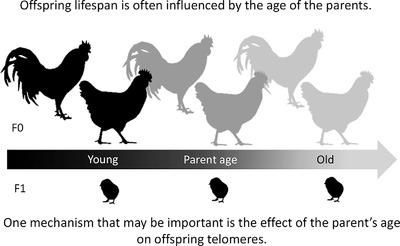Our official English website, www.x-mol.net, welcomes your feedback! (Note: you will need to create a separate account there.)
Cross-Generational Effects of Parental Age on Offspring Longevity: Are Telomeres an Important Underlying Mechanism?
BioEssays ( IF 4 ) Pub Date : 2020-07-30 , DOI: 10.1002/bies.201900227 Britt J Heidinger 1 , Rebecca C Young 1
BioEssays ( IF 4 ) Pub Date : 2020-07-30 , DOI: 10.1002/bies.201900227 Britt J Heidinger 1 , Rebecca C Young 1
Affiliation

|
Parental age at offspring conception often influences offspring longevity, but the mechanisms underlying this link are poorly understood. One mechanism that may be important is telomeres, highly conserved, repetitive sections of non‐coding DNA that form protective caps at chromosome ends and are often positively associated with longevity. Here, the potential pathways by which the age of the parents at the time of conception may impact offspring telomeres are described first, including direct effects on parental gamete telomeres and indirect effects on offspring telomere loss during pre‐ or post‐natal development. Then a surge of recent studies demonstrating the effects of parental age on offspring telomeres in diverse taxa are reviewed. In doing so, important areas for future research and experimental approaches that will enhance the understanding of how and when these effects likely occur are highlighted. It is concluded by considering the potential evolutionary consequences of parental age on offspring telomeres.
中文翻译:

父母年龄对后代寿命的跨代影响:端粒是重要的潜在机制吗?
后代受孕时的父母年龄通常会影响后代的寿命,但人们对这种联系背后的机制知之甚少。一种可能很重要的机制是端粒,这是非编码 DNA 的高度保守的重复部分,在染色体末端形成保护帽,通常与寿命呈正相关。在这里,首先描述了父母受孕时的年龄可能影响后代端粒的潜在途径,包括对父母配子端粒的直接影响和对产前或产后发育过程中后代端粒丢失的间接影响。然后回顾了最近的大量研究,这些研究证明了父母年龄对不同分类群中后代端粒的影响。这样做时,强调了未来研究和实验方法的重要领域,这些领域将增强对这些影响可能如何以及何时发生的理解。通过考虑父母年龄对后代端粒的潜在进化后果得出结论。
更新日期:2020-08-26
中文翻译:

父母年龄对后代寿命的跨代影响:端粒是重要的潜在机制吗?
后代受孕时的父母年龄通常会影响后代的寿命,但人们对这种联系背后的机制知之甚少。一种可能很重要的机制是端粒,这是非编码 DNA 的高度保守的重复部分,在染色体末端形成保护帽,通常与寿命呈正相关。在这里,首先描述了父母受孕时的年龄可能影响后代端粒的潜在途径,包括对父母配子端粒的直接影响和对产前或产后发育过程中后代端粒丢失的间接影响。然后回顾了最近的大量研究,这些研究证明了父母年龄对不同分类群中后代端粒的影响。这样做时,强调了未来研究和实验方法的重要领域,这些领域将增强对这些影响可能如何以及何时发生的理解。通过考虑父母年龄对后代端粒的潜在进化后果得出结论。


























 京公网安备 11010802027423号
京公网安备 11010802027423号